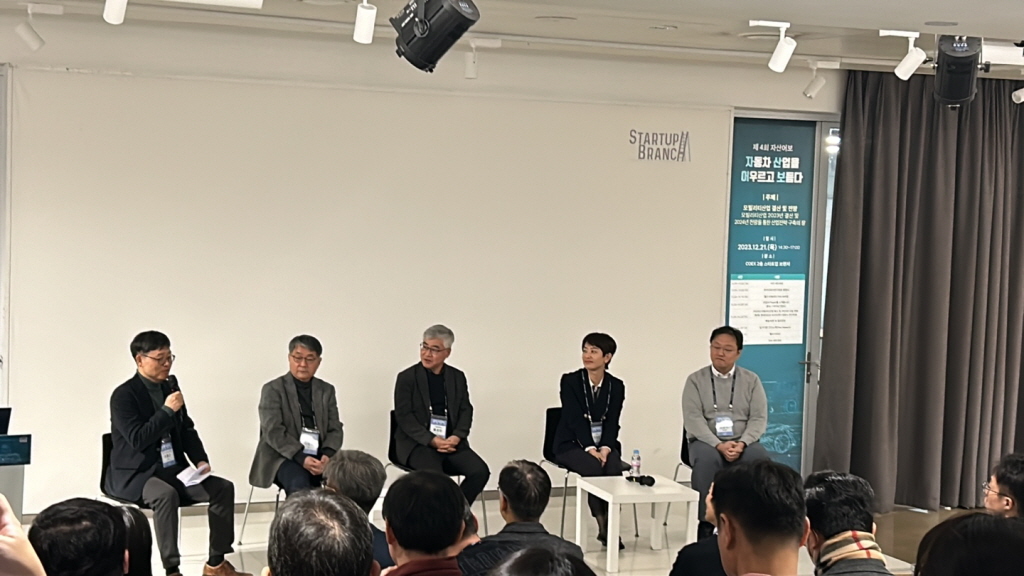자동차 산업의 전문가들이 중소기업들은 모빌리티 기술의 키워드인 C.A.S.E가 아닌 SDV로 방향성을 가져가야 한다는 의견과 함께 지속되고 있는 자동차 산업에서의 인력 문제를 꼬집었다.

▲제4회 자산어보 행사 현장 (왼쪽부터)전종근 한국자동차산업학회 학회장, 이항구 자동차융합기술원 원장, 홍성수 서울대학교 교수, 이정문 LG전자 팀장, 장문수 현대차증권 연구위원
한자연, ‘제4회 자산어보’개최…2024년 거시적 전망·대응전략 주제
“OEM Tier1으로 전락…소프트웨어·서비스 기업 권력 이어받을 것”
“인력 양성 사업 진행 but 전문 인력 감소…생산직 대부분 외국인”
자동차 산업의 전문가들이 중소기업들은 모빌리티 기술의 키워드인 C.A.S.E가 아닌 SDV로 방향성을 가져가야 한다는 의견과 함께 지속되고 있는 자동차 산업에서의 인력 문제를 꼬집었다.
홍성수 서울대학교 전기정보공학과 교수와 이항구 자동차융합기술원 원장은 한자연이 지난 21일 코엑스 스타트업 브랜치에서 모빌리티 산업 결산과 전망을 주제로 개최한 ‘제4회 자산어보’ 행사에서 모빌리티 산업 결산과 전망을 주제로 2023년을 마무리하며 1년 간의 모빌리티 산업을 회고하고 2024년의 거시적인 전망 및 대응전략 등에 대해 이야기했다.
홍성수 교수는 나승식 한국자동차연구원 원장이 개회사에서 이야기했던 ‘살아남는 자가 강한 것’이라는 이야기를 되풀이하며 “10년, 20년 살아남기 위해서는 내년에 살아남는 것이 우선이 되야 한다”며 “단기적 미래에 선택해야 할 R&D는 무엇인지부터 고민해야 한다”고 강조했다.
홍 교수는 “2013년부터 모빌리티 시장의 대표적인 키워드로 꼽히는 C.A.S.E를 비판적인 시각으로 바라보았을 때 실체화된 것이 하나도 없다”고 비판했다.
C.A.S.E는 Connectivity(연결성), Autonomous(자율주행), Sharing(공유), Electrification(전동화)다.
Connectiviy는 우리나라의 경우 이제서야 LTE-V2X로 통신방식이 정해졌으며, 5G를 기반으로 통신 관련 기업들이 달려들었으나 실체화된 서비스는 없으며, Autonomous 자율주행 또한 활발한 실증 사업에도 산업적 기대감이 낮아진 상태다.
홍 교수는 “Shared에서 파생되는 서비스도 없을뿐더러 사겠다는 사람도 없고, Electrification의 경우 저가화 전략으로 쏟아져 나오고 있는 LFP배터리가 재활용이 되지 않고 버려진다면 친환경차라고 불릴 수 있는지에 대한 의문에서 나오는 한계에 부딪힌다”라는 시각을 나타냈다.
결국 2013년에서 바라본 10년 뒤의 빛나는 미래는 현재 이뤄진 것이 없다는 뜻이다.
홍성수 교수는 “국가와 한국자동차연구원 같은 기관들은 C.A.S.E에 대해 연구할 의무가 있으나, 내년에 살아남아야 하는 중소기업들은 아니다”라며 “자동차 부품 기업들은 물품에서 벗어나 소프트웨어 판매에 대해 진지하게 고민할 필요가 있다”고 전했다.
그는 SDV가 자리잡는다면 절대적인 권력을 쥐고 있는 OEM들이 Tier1으로 전락하고, 소프트웨어와 서비스 관련 기업들이 권력을 이어받게 될 것이라는 전망을 내놓았다.
이는 지난 8일 e4ds news가 벡터코리아와 진행한 ‘SDV 아키텍처 최신 트렌드’ 웨비나 내용과 뜻을 같이 한다.
연사로 나왔던 김의열 벡터코리아 사업부장은 “OEM은 소프트웨어의 전문가로 활동하며 HPC의 통합에 대한 역할을 수행할 것이며, 기존 Tier1들은 완전한 플랫폼을 공급하는 0.5 Tier 역할을 하거나, 소프트웨어 혹은 하드웨어 일부를 납품하는 1.5 Tier의 역할을 맡을 것으로 보인다”며 “기존 Tier2는 Tier1을 거치지 않고, 바로 OEM과 파트너십을 맺으며 1.5Tier가 될 수도 있으며 새로운 플레이어인 아마존, 구글과 같은 테크 기업들이 Tier1이나 2처럼 활동할 것”이라고 전한 바 있다.
만약 도널드 트럼프가 미국 대통령으로 다시 당선되어 전기차 프로모션이 중지될 경우, 시장이 완전히 달라질 수 있는 가능성이 있지만 운전자 제스처 인식 등 소프트웨어는 굳건할 것이라는 의견과 함께 홍성수 교수는 SDV 시범 서비스들이 족족 등장하고 있는 지금 고객이 기꺼이 돈을 지불할 서비스를 만들어 내는 것이 중요하다고 강조했다.
이항구 자동차융합기술원 원장은 자동차 산업의 인력난에 고민을 토로하며 현대차의 높은 수익성이 가져오는 착시에서 벗어나야 한다고 강조했다.
1조원 규모로 대학 등에서 인력 양성 사업이 진행되고 있지만 전문 인력은 오히려 줄어들고 있으며, R&D 투입 금액 10조원 중 현대차 투자 비중이 78%이기에 나라의 현대차 의존도는 높아지고 있는 상황이다.
현대차와 관련이 없는 비계열사에 투입되는 금액은 3조원 남짓으로 독일 Bosch사의 1년 R&D 비용의 3분의 1밖에 되지 않는 상황을 이항구 원장은 미래차 전환으로 나아가지 못하는 이유로 꼽았다.
그는 이어 2024년 하반기부터 도산하는 중소기업들이 많이 늘어날 것이라는 자동차융합기술원의분석을 이야기하며 이번 년도 부품업체 평균 영업이율이 조금 높아졌지만 이자 보상 비율도 되지 않는 최악의 시대이기에, 재투자도 사실상 불가능하다고 우려 섞인 목소리를 냈다.
또한, 현장 생산 인력의 대부분이 외국인이다.
이직 등이 잦은 외국인 노동자로 미루어 볼 때 품질 문제가 언젠가는 문제가 될 것으로 이항구 원장은 내다봤다.
자동차의 뼈대인 부품사에서의 품질 문제가 공급망 전체의 문제로 확대될 수 있기에 지금부터 대비해야 한다며, 지속가능한 성장 기반을 구축할 수 있는 정책이 반드시 필요하다고 강조했다.
한편 한자연이 주관한 자산어보 행사는 ‘자동차 산업을 어우르고 보듬다’의 약자로, 모빌리티 산업 구성원들의 정기적인 만남과 교류를 기반으로 유익한 정보를 공유하고, 구성원 간의 협업 확대를 목적으로 하는 모빌리티 산업의 정기 네트워킹 행사다.
 ▲제4회 자산어보 행사 현장 (왼쪽부터)전종근 한국자동차산업학회 학회장, 이항구 자동차융합기술원 원장, 홍성수 서울대학교 교수, 이정문 LG전자 팀장, 장문수 현대차증권 연구위원
▲제4회 자산어보 행사 현장 (왼쪽부터)전종근 한국자동차산업학회 학회장, 이항구 자동차융합기술원 원장, 홍성수 서울대학교 교수, 이정문 LG전자 팀장, 장문수 현대차증권 연구위원